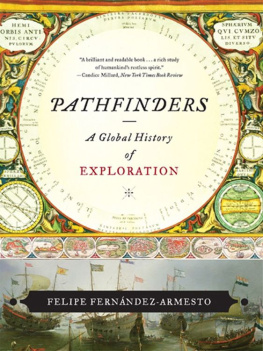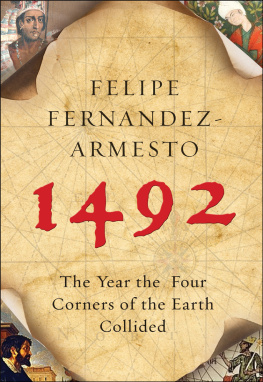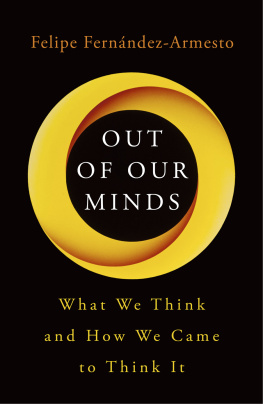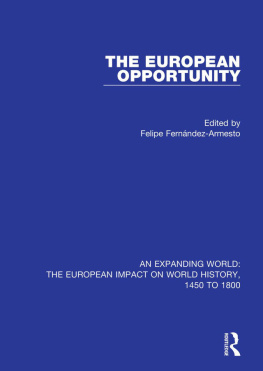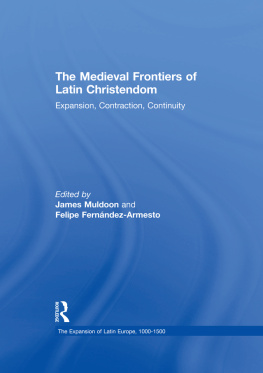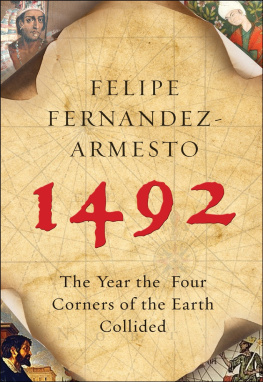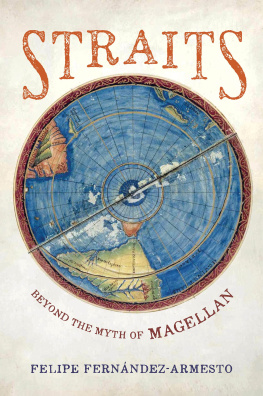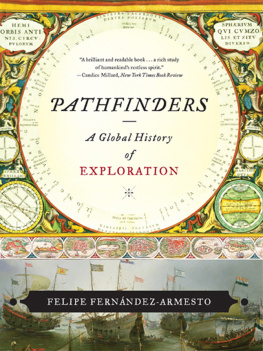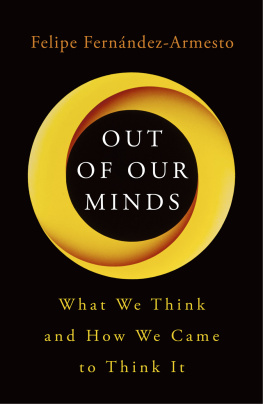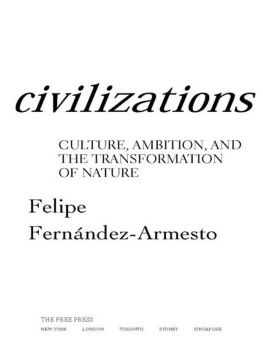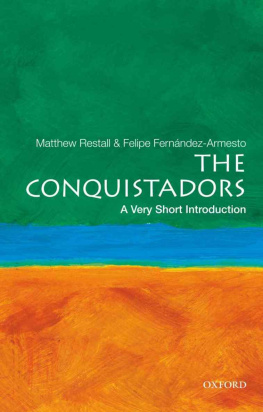
To Rafael del Pino
So give me those two powers of love and longing
That numb gods thoughts and every human notion,
For I must reach the ends of springing, thronging
Earth, and cross the god-begetting Ocean.
Homer, Iliad 14


First, my son, observe that in this world we travel through likenesses and enigmas since the spirit of truth is not of this world nor can it be seized through it. We are carried off towards the unknown, but only metaphorically...
Nicholas of Cusa, letter to Nicolaus Albergati
Contents
This book is about encountersencounters between culturesand the outreach of ambitions, imaginations, efforts, and innovations that made them possible. The book, too, is the result of a meeting of minds. The ambition to write something like it has been rattling inside my head for at least a decade and a halfever since I began work on The Times Atlas of World Exploration . But I never really expected to have the chance or to be able to devise a practicable approach to the vast and unwieldy subject until the dinner table conversation of my friends Carlos Martnez de Campos, President of the Sociedad Geogrfica Espaola, and Virgilio Oate, President of the Fundacin Geogrfica Espaola, impelled me to it and helped me begin to see the way forward.
The decisive influence has been that of Rafael del Pino y Moreno, engineer, businessman, and outstanding philanthropist. At the time of our meeting, he had completed a journey in the wake of great maritime explorers in a yacht he had designed himself. I hope, he said, to see you write a global history of exploration before I die. There was a touch of morbid humor in this irresistible proposal, for he was then a robust and vital octogenarian of delightful sprightliness. But while I was at work on the early stages of the book, a terrible accident befell him, which induced almost total paralysis, and made the project a heartfelt and urgent endeavour for me. Don Rafael bore his affliction with exemplary fortitude. I am indebted to him for the stimulus to write it, as well as for the interest and input of ideas with which he nourished and sustained it. My debt to the Foundation which bears his name, for a research grant, and for a further munificent grant toward the cost of maps and illustrations, is almost equally profound: without that generous help, I could not have set aside time for the work. Throughout, Amadeo Petitb, Director of the Fundacin del Pino, has been endlessly helpful, understanding, and supportive. As I wrote, he and Virgilio Oate took great pains to read the text and help me reflect on it and improve it.
I am also grateful to the readers of Oxford University Press for helpful and insightful comments, and to my editors, Luciana OFlaherty of Oxford University Press, Steve Forman of Norton, and Mauricio Bach of Destino, for their skill and forbearance. My colleagues in the History and Geography Departments and the Arts Research Centre at Queen Mary, University of London, where most of the book was written, providedwith the help of the Colleges exceptionally enlightened leadership and managementthe best environment imaginable in which to teach and learn. I finished the book in the History Department at Tufts University, where I have been lucky to find a generous welcome and inexhaustible collegiality. Over a longer period, I learned most of what I know about exploration from my fellow members of the Hakluyt Society and my collaborators in The Times Atlas of World Exploration . Of course, patches of ignorance and errors of fact must mar the book: those, at least, are all my own.
F.F.A.
Babylonian world map, c. 600 BC
The world according to the Persian geographer al-Istakhri, 1193
Islands visited by the Portuguese explorer Diogo de Silves in a map of 1439
The Lisbon waterfront, from Civitates Orbis Terrarum by Georg Braun and Franz Hogenberg, c. 1572
The mappa mundi of Fra Mauro, 1459
Monumenta Cartographia, 1502
Mercators double-hemisphere world map, 1587, with conjectured southern continent
The German naturalist Alexander von Humboldt setting out to climb Mount Chimborazo, June 1802
The original maps in this book were drawn by David Atkinson of Hand Made Maps ( www.handmademaps.com )

So many gods, so many creeds,
So many paths that wind and wind...
Ella Wheeler Wilcox, The Worlds Need
H ISTORY has two big stories to tell. The first is the very long story of how human cultures divergedhow they parted and developed differences, in ignorance or contempt of one another. The second is the main subject of this book: a relatively short and recent story of convergenceof how human groups got back in touch, exchanged culture, copied each others lives, and became more like each other again.
The first story occupies most of history, extending over about 150,000 years, roughly from the emergence of Homo sapiens almost to the present day: the record of how human cultures formed, became mutually differentiated, drew apart, and grew more disparate and dissimilar, until we got to where we are: in a world teeming with difference, in which pluralism is, paradoxically, the one great shared value we dare not forgo. Imagine a cosmic observer, contemplating humankind from immensely remote space and time, seeing us with the kind of objectivity that wewho are enmeshed in our own historyare unable to attain. Imagine asking herfor, perhaps on the basis of my own experience of home life, I see omniscience and omnipresence as female qualitieshow she would characterize the history of our species on our planet. Imagine her answer. It would be brief: such puny creatures as we are, in such a tiny patch of the universe, would hardly be worth much comment. The cosmic observer would surely say that our history was, above all, experience of increasing diversity.
The second story, which matters so much to us but which, I suspect, the cosmic observer might hardly notice, has overlapped with the first for perhaps the last 10,000 years or so. Gradually, it has become the predominant story, as cultural exchange has speeded up and extended its range, until, today, the way global culture seems to get more and more homogeneouseven more uniformhas become, to us, the most conspicuous theme of human experience all over the world.1
Both stories, I contend, are stories of exploration. But we know too little about the first for it to get more than a few pages coverage in what follows. Societies would never have grown apart without the pathfinders who led them along divergent routes into contrasting environments and separate homelands. They would never have resumed mutual relations, and changed each other, without later generations of explorers, who found the routes of contact, commerce, conflict, and contagion that rejoined them. Explorers were the engineers of historys infrastructures, the builders of the causeways of culture, forgers of links, spinners of webs.
Convergence generated a lot of surviving evidence; the era of divergence has left almost none. Convergence is the story we think of as ours: it is what we need to explain to ourselves in order to understand the world we live in and plan its future. That is the justification for devoting a book to explaining how it happened. But, first, it is worth looking back briefly at the work of the pathfinders who led human communities apart from one another, because that work, too, was a triumph of exploration. By sketching it into the background, we can see the achievement of later explorers in more vivid relief, and understand how important it was in the making of the world we live in now.
Next page
